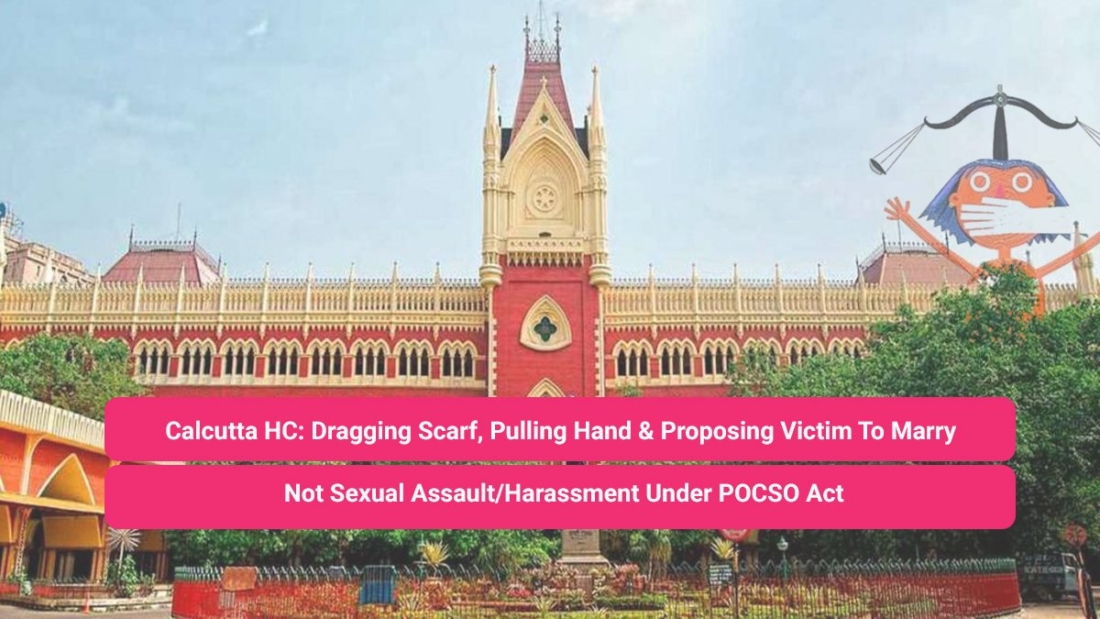In the matter Nurai Sk. @ Nurul Sk. Vs. State of West Bengal, the Calcutta High Court on 15.11.2021 observed that the act of dragging ‘orna’ (women scarf), pulling hand of the victim and proposing her to marry does not come within the definition of either ‘Sexual Assault’ or ‘Sexual Harassment’ under the Protection of Children from Sexual Offences Act (‘POCSO Act’).
Facts-
It is the prosecution’s case that, the victim girl was returning from school and on her way back to home, the accused dragged her ‘orna’ and proposed her to marry. He also threatened her to cause injury by throwing acid on her body if the victim girl refused to accede to his proposal.
The Learned Trial Judge on appreciation of evidence held that the specific act of the accused of dragging the ‘orna’ of the victim girl and insisting her to marry him was done with intent to outrage her modesty with sexual intent. The accused has caused her sexual assault and harassment by physical contact by pulling her hand and advance unwelcome and explicit sexual overtures to marry him. Therefore, the learned Trial Judge held the accused guilty for committing offence under Sections 8 and 12 of the POCSO Act. He also held that the specific act of the accused in the nature of sexual harassment within the meaning of Section 354 A (1)(ii) of the Indian Penal Code.
Observations of High Court-
- On appeal, the High Court before going into the merits of the matter, discussed the judgment of the Supreme Court in State of Rajasthan vs. Om Prakash in which it was stated that it is necessary for courts to have a sensitive approach when dealing with cases of child rape since the effect of such a crime on the mind of the child is likely to be lifelong.
- The Court pointed out that administration of justice is not “one way traffic” and criminal justice must be imparted on the basis of the case and counter case based on facts and evidence, both oral and documentary.
- Moving to the merits of the case, the Court adverted to the fact that there were irregularities in the victim’s statement, and she had wrongly asserted the date and time of the incident while under oath. She had deposed that the incident took place on August 27 at 10:30 AM as opposed to August 24 at 4:10 PM. Although this irregularity was rectified when the victim was made to depose again, the Court remarked that the deviation created doubt and the Court had reason to hold that no such incident occurred.
- The Court remarked that “In a criminal trial date of occurrence, time of occurrence and place of occurrence are the most vital pieces of evidence which the prosecution is bound to prove beyond any shadow of doubt. If there is a deviation of the above-mentioned three facts, the entire case remains doubtful because the Court is every reason to hold that no such incident took place at the given time in the given manner at the given place and the accused is entitled to get benefit of doubt,”
- Additionally, the statement of the victim’s uncle, the complainant, in the First Information Report (FIR) was considered. He had stated that accused dragged the hand of the victim. The allegation that the accused pulled her hand was introduced by the victim in her statement under Section 164 of the Criminal Procedure Code. The Court, however, observed that a statement under Section 164 was not a substantive piece of evidence and can only be used for corroboration or contradiction. “Such statement under Section 164 of the Code of Criminal Procedure should not be taken into consideration where the victim tried to exaggerate the incident.”
- The Court held that even if the allegations were true, they will not constitute an offence under the POCSO Act.
- Thus, after considering the circumstances and provisions of the Indian Penal Code and POCSO Act, Justice Chaudhuri concluded that at best, the accused could be held liable under Section 354A read with Section 506 of the Indian Penal Code.
The accused was acquitted of offences under Sections 354, 354B and 509 of the Indian Penal Code as well as Sections 8 and 12 of the POCSO Act. For the offences under Sections 354A(1)(ii) and Section 506 of the Indian Penal Code, the conviction was affirmed. The Court directed that if the accused had served his sentence for the convicted offences, he be released from the correction home.
– Vaishali Jain, Advocate & Associate – Child Safety at Work
 Cart is empty
Cart is empty 

